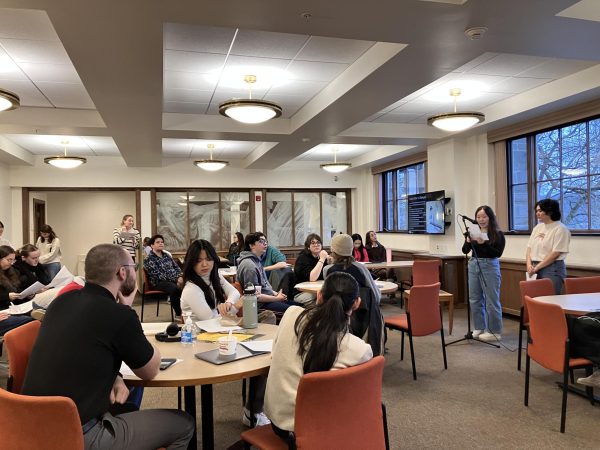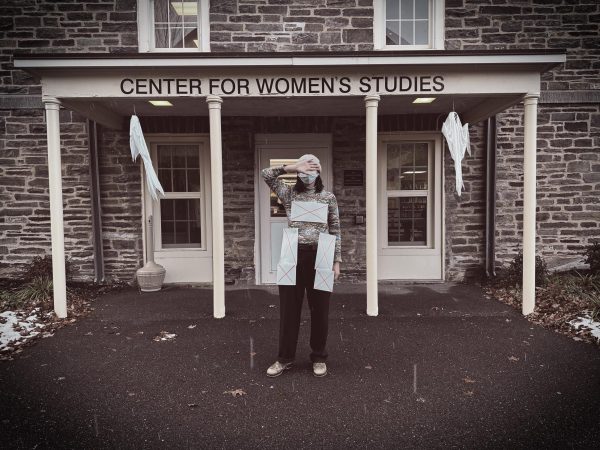Living Writers: Sigrid Nunez
Although I was unfamiliar with her, Sigrid Nunez successfully captivated and impressed me, along with the rest of her audience. Throughout her Living Writers lecture, Nunez evoked many topics of profound insight that lingered in my mind. Even though her background contrasts greatly with that of my own generation, she still endowed the young crowd with a sense of comfort and affability. Nunez has published six novels and her work has also appeared in several anthologies, such as three Pushcart Prize volumes and four anthologies of Asian-American literature. Additionally, she has contributed to The New York Times, Harper’s, O: The Oprah Magazine and other prestigious publications. She has taught at Amherst College, Smith College, Columbia University and Parsons the New School. During this current semester, Nunez works in the writing program at Boston University teaching a graduate-level fiction workshop and, beginning this February, she will take the position of Writer-in-Residence at Vassar College.
The students attending Nunez’s Living Writers assembly read her novel The Last of Her Kind. Nunez describes it as a novel about establishing identity, comprising the formation of personal conviction. Rather than speaking about this book, she began by reading a piece that she introduced as having no determined genre yet. It involved many cerebral quotes followed by equally intriguing deliberations of their topics. Insomnia was among the topics mentioned. She noted the old cure for it, recalling one’s life experiences and then compared this with writing. Nunez further questioned whether it was true that insomnia is the inability to forget, perhaps revealing a truth behind her own writing. She then went on to discuss writer’s block and how simple it can be to overcome such a widespread dilemma. While Nunez doesn’t describe her work as humorous, it became evident how comedic it truly is. Her personal recount of a homeless man sifting through the trash only to find magazines he would complain of as being “all trash these days” was certainly an example of this attribute. The bulk of the lecture was devoted to reading her short story “Philosophers.” The anecdote she provided was insightful. In her words, this story was “essayistic and allegorical” in style. The narrator’s unconventional love triangle between her classmate Ace and favorite teacher Mrs. Mint provided perspective into inner longings, relationships and maturity, but ultimately into writing and passion. Through frequent observational remarks and sarcastic tones, her short story was enhanced with redeeming wit. Despite Ace’s untimely death, he and Mrs. Mint ended up having a two year marriage that nonetheless caused Mrs. Mint to believe in love again, principally through Ace’s philosophy on life and capability to love her.
One of the last things Nunez responded to was a question about New York City. This stimulated a lengthy opinion on the city that was irrefutable. Nunez denoted New York City as the capital of the twentieth century. She further elucidated its wide range of prospects that mostly overlooked background. She reflected on the excitement of this risky place while still acknowledging that much of this stemmed from its dangerousness. Nunez highly venerated such a place, where you could maintain your anonymity while meeting tons of people. This description rapidly shifted to elucidating the disparity with the modern city. Nunez asserts that the city’s old image and appeal unfortunately only persist in fiction. Furthermore, she confidently predicts that it won’t be written about nearly as much in literature, labeling its new atmosphere “bo-ring.”
Throughout her lecture, Nunez periodically brought up a quote she had reiterated at the beginning. This quote claimed that all writing is generated and esteemed on the foundation of despair. At the end of “Philosophers,” she depicted writing as a means of coping with life. When asked if she writes about despair herself, Nunez responded that she “wouldn’t argue” that that is primarily what she writes about. I tremendously admire her aptitude for taking such sentiments and constructing them into stories, embodied by characters worthy of empathy. Further I esteem her capacity to convert grave emotion into humor. Such sincerity prevails as a treasure of her unquestionable uniqueness.
Contact Julia Berman at [email protected].




